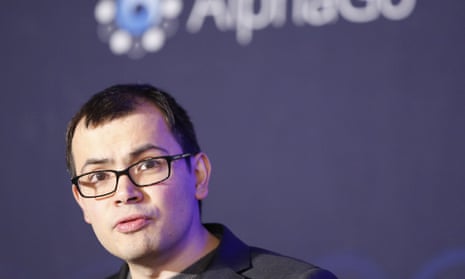At first glance, Demis Hassabis is an unusual figure for Dominic Cummings to have turned to for guidance in March 2020 about the threat of the novel coronavirus bearing down on the UK.
The co-founder of Google subsidiary DeepMind, which is dedicated to high-level AI research, has a varied CV, but is no epidemiologist. A child chess prodigy, he hit the rank of master at 13 and was for a brief time the second-highest-rated player in the world in his age category.
After completing his A-levels two years early, he joined video game studio Bullfrog, where he co-designed the hit classic Theme Park at just 17 years old, before leaving to study computer science at Cambridge. He returned to video game development for another decade, and, after switching back to academia and a PhD in cognitive neuroscience, founded DeepMind in 2011.
In the decade since, during which DeepMind was sold to Google for £400m, the company has worked on a number of healthcare problems. One arm, DeepMind Health, controversially partnered with the NHS to try to build apps to help doctors monitor kidney infections.
Another branch of the company, the one Hassabis was more directly involved in, focused on theoretical breakthroughs first, with applications coming later: the company succeeded in building AIs with world-beating performance at games including Go, chess and the video game Starcraft II. Last year, those breakthroughs were also applied to tackling health problems, as DeepMind announced a stunning breakthrough “in the tricky problem of protein folding”.
But, DeepMind says, Hassabis wasn’t invited to talk about his work. “Demis was one of several scientists who contributed his thoughts on the government’s response to Covid-19,” a DeepMind spokesperson told the Guardian. “He attended one Sage meeting in-person on 18 March. The views he shared with fellow Sage members, officials, and government advisers, including Dominic Cummings, were based purely on reviewing publicly available international data.
“Along with many other scientists at the time, Demis was a proponent of fast and decisive lockdown measures based on public evidence drawn from what was happening in other countries. He was acting in a personal capacity as a leading data scientist in the public interest.”
Cummings has a well-documented fascination with the world of science. In the same early stages of the UK’s response, he contacted Prof Timothy Gowers, a Fields-medal-winning mathematician, who was on the steering committee of the newly established Data Evaluation and Learning for Viral Epidemics, or Delve, group, which reported in favour of face mask use in May 2020. But, as well as being a generally respected scientist, Hassabis is linked to the rationalist movement, which has guided much of Cummings’ thinking.
“We know that Dom is rationalist-influenced from his own blogroll and comments,” says Tom Chivers, author of a book on the movement, The AI Does Not Hate You. While Hassabis is not himself a member of the community, his involvement in advanced AI research brings him into the same circles.
“What rationalism implies from a policy perspective is a big question,” Chivers says, “but you can see something like it in the effective altruist mode of thinking: trying to separate emotional responses from outcomes. And, by extension, it can lead to serious thought about long-term existential risks, AI and bio-terror, because they have the potential to crush human flourishing in the long term.”
